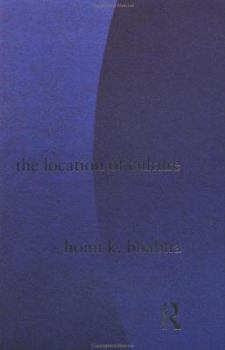The Location of Culture
Select Format
Select Condition 
Book Overview
Rethinking questions of identity, social agency and national affiliation, Bhabha provides a working, if controversial, theory of cultural hybridity - one that goes far beyond previous attempts by... This description may be from another edition of this product.
Format:Paperback
Language:English
ISBN:0415054060
ISBN13:9780415054065
Release Date:January 1994
Publisher:Routledge
Length:304 Pages
Weight:1.45 lbs.
Dimensions:0.9" x 6.1" x 9.2"
Age Range:18 years and up
Grade Range:Postsecondary
Customer Reviews
5 ratings
Product Review
Published by Thriftbooks.com User , 14 years ago
The book was in the condition that it was specified in the product description. It arrived within the delivery date estimate.
The enunciatory present
Published by Thriftbooks.com User , 18 years ago
In The Location of Culture, Bhabha argues for a fundamental realignment of the methodology of cultural analysis away from ontology toward the "performative" and "enunciatory present" (p.178). Such a shift, he claims, provides a basis for the negotiation of cultural difference rather than its automatic repression or negation in the face of irreconcilable oppositions. Bhabha's emphasis on the enunciative production of meaning places the emphasis of critical inquiry on issues of representation or signification, thereby producing "a temporality that makes it possible to conceive of the articulation of antagonistic or contradictory elements" (p.25). This argument represents a critical attack on the Western production of binary oppositions, traditionally defined in terms of centre and margin, civilised and savage, enlightened and ignorant. Bhabha questions the easy recourse to consolidated dualisms by repudiating fixed and authentic centres of truth, suggesting that cultures interact, transgress and transform each other in a much more complex manner than typical binary oppositions allow. According to him, hybridity and linguistic multivocality have the potential to intervene and dislocate the process of domination through the re-interpretation and re-deployment of received discourse, thus re-focusing critical attention towards the "agonistic space" (181) which exists on the borders of difference, along the edges of alterity, where cultures meet. Bhabha celebrates cultural heterogeneity and the subversive effects of hybridisation.
Obscure but ultimately an eye(and text) opening theory
Published by Thriftbooks.com User , 22 years ago
Bhabha is writing about a terrain which is perhaps best understood when being applied to a specific text. The theory all by itself sounds fascinating but obscure, when you see Bhabhas theory in practice, however,it makes all kinds of sense and yields extremely nuanced readings of texts you may have thought you knew very well. In Writing India(published 1996) Bart Moore-Gilbert uses Bhabha's theory to great effect in his analysis of Kipling.Also Bart Moore-Gilbert gives an excellent and concise summary of Bhabhas work as well as excellent summaries of Said and Spivak(as well as detailed analysis of criticisms of their work) in Postcolonial Theory Contexts Practices(published 1997). All in crystal clear prose.
Fantastic work
Published by Thriftbooks.com User , 24 years ago
Anybody who is foolish enough to even attempt to sum up Bhabha's fine work in two words immediately shows their ignorance. However, anyone who could possibly call the book either bland or boring shows their plain stupidity. Though the book is complex, and not easily understood by those completely new to the field of post-colonial theory, it contains many sections of excellent writing, reminiscent of Naipaul, as well as many insights which are remarkable in their profundity. Reading Bhabha has been a wonderful experience and I strongly urge anyone interested in this topic to buy and study the book immediately.
An Extremely Fine Work
Published by Thriftbooks.com User , 25 years ago
I was both suprised and appalled to read the 1st review of this book. Clearly the author is one of the "anxious graduate students" that is referred to. Bhabha's writing is clear and engaging, and his thoughts and ideas fascinating. The depth of knowledge, combined with the profound ideas contained within, make this book one of the finest in its field, and mark Bhabha as one of the leading post-colonial theorists of his era and others too.





